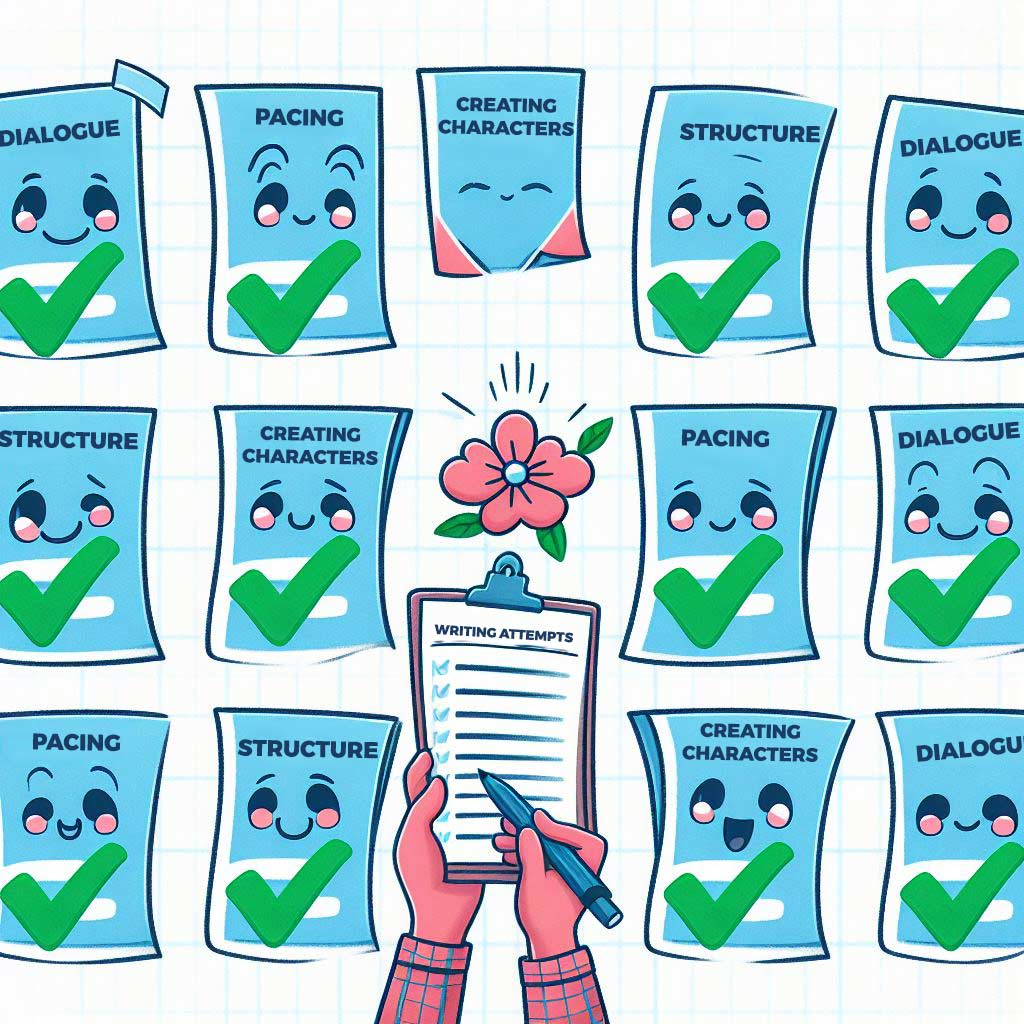Have you ever dreamed of mastering the art of writing compelling movie or TV screenplays? Maybe you fantasize about crafting the next binge-worthy Netflix series. Or you imagined hearing a room full of industry executives pitching your original film script to studios.
But like most mere mortals, your screenwriting aspirations have probably long stayed locked away – never to reach those lofty Hollywood heights. After all, who has time to complete an entire unsolicited spec script after work and family obligations?
Though the odds seem impossible stacked against unknown writers breaking into the entertainment industry’s inner circle, here’s the good news…
Anyone – yes even YOU – Can and Should Practice Screenwriting Just for Fun!

The truth is that reclusive activities like consistent screenwriting practice have intrinsic value completely separate from profit-seeking end products pitched to impossible-to-reach executives.
Just like painters still benefit from doodling random sketches that never leave their studio, amateur writers grow their creative capacity via consistent practice. Novices shouldn’t be intimidated just because they lack industry visibility or connections.
You need not have ironclad plans to officially publish your someday cinema opus pieces. At least not yet, anyway!
So let your perfectionism and imposter syndrome fade away dear budding screenwriter. The path you’ve discovered alone in your home office already overflows with rewarding adventures.
Keep reading to unlock approaches for maximizing enjoyment via informal screenwriting just for its own sake.
Why Write Imaginary Screenplays With No Production Plans?
Some may wonder why anyone would practice writing entire make-believe movie scripts with no actual footage destined for theater screens. Doing so sounds like volunteering for a second unpaid job after a long work week!
However, what the cynics fail to realize is that routine screenwriting offers some profoundly uplifting side effects beyond fame or critical success. The act alone fuels growth in these key areas:
- Creativity – Just envisioning engaging fictional worlds stretches your imagination constantly
- Communication – Script formatting forces concise expression critical in all domains
- Connection – Stories reflect themes revealing your innermost concepts and values

Writing unofficial speculative (spec) scripts need not produce direct profit potential or visibility. Yet the indirect benefits permeate all corners of your sphere.
And unlike stereotypical views of isolated writers, screenplay practice fosters amazing opportunities for genuine human connection! Share drafts to get candid feedback from friends.
Join amateur writer networks to exchange ideas. Bounce concepts off colleagues who share artistic interests even with no industry ties.
Much like open mic poetry gatherings give novice wordsmiths creative outlets without requiring instant profit motives, screenwriting offers similar no-pressure fun for aspiring cinema storytellers!
Ways for Beginners to Start Practicing Screenwriting
Feeling motivated to unlock screenwriting’s hidden perks yet unsure how or where to start as a novice? No worries! Consistent skills development begins with a single blank page.
Kickstart your practice via activities perfectly tailored for newbies:
- Compose Random Scenes Focusing Just on Dialogue – Master snappy script talk before complex narratives!
- Rewrite Existing Movie Scenes from Film Favorites – Study master storytellers’ techniques up close to internalize solutions for common beginner challenges like introducing characters smoothly and incorporating enough rising action before climactic peaks.

- Join Informal Screenwriting Groups Online for Motivation/Feedback – Workshop drafts without pressure among fellow learners for inspiration and constructive critiques. Develop thick skin early for survival once your later masterworks hit primetime!
- Use Free Screenwriting Apps/Software like Celtx and Fade In – Format properly as real screenwriters do sans expensive paid tools
The best first screenwriting attempts emphasize bite-sized objectives tackling limited complexity. Eventually, your toolkit will contain sufficient concepts and vocabulary for architecting sprawling trilogies or shared universe spinoffs! But initially stick with self-contained sequences or one-act plays to gain confidence.
Baby steps first! Momentum and consistency above all else are key to cementing sustainable screenwriting habits over the long haul until they become second nature.
Practice Screenwriting By Pulling Ideas from Everyday Life
Stumped on cooking up weird, wonderful characters or laugh-out-loud punchy dialogue from thin air as a green screenwriting apprentice? You’re not alone in your early frustrations!
Fortunately, nearly unlimited inspirational fodder hides in plain sight all around you every single day. Open your senses wider to uncover these literary goldmines perfect for harvesting using strategies like:
- Eavesdrop on Interesting Conversations Around You for Dialogue Ideas – From passionate political debates at the next café table to silly kids’ nonsensical playground banter, tune your ears to playwright-quality narrative material!

- People Watch Colorful Personalities Around You to Inspire Fictional Archetypes – The loud talkative tech bro, the harried frazzled mom, the cranky complaining elder…need I describe more? Just sit back, relax, and let the vivid characters write themselves!
- Observe “What If” Scenarios Playing Out Around You Ripe for Dramatic Fictional Twists – Real life provides endless slice-of-life vignettes rich with storytelling potential if you mentally tweak circumstances just so. Add stakes and interpersonal drama…voila…compelling on-screen conflicts bloom instantly from mundane seeds!
When struggling for inspiration, instead of retreating inward try directing your observational powers outward. Allow creativity to percolate indirectly for a change.
Soon your senses will automatically trigger at any curious sight, sound, or spoken syllable primed for adaptation to the big small screen inside your vivid imagination.
Eventually, no external stimuli get wasted or taken for granted once your screenwriter’s lens shifts permanently to its wide-angle highest zoom setting!
Advanced Screenwriting Practice Techniques
Ready to take your practice escapades up a notch into official structured training territory? Mix things up using popular techniques screenwriters employ to sharpen skills specifically on spec scripts for existing properties or amateur competition circuits.
Consider advanced practice hacks like:
- Writing Spec Movie/TV Scripts Starring Established Franchise Characters – Take creative liberty to unofficially pen Fast and Furious or Stranger Things episodic adventures just for personal skill building.
- Entering Amateur Screenwriting Contests for Deadlines/Motivation – Whether film festivals or online competitions, committing to regularly submitting one-act shorts or feature pilot entries gives helpful guidelines.

- Enrolling in a Scriptwriting Course at a Local College or Online – Learn from seasoned veterans – at least long enough to internalize universal narrative principles before returning to self-driven solo practice.
Eventually, channel that stockpiled an arsenal of tools into your own original pilot or feature film passion project when properly armed with sufficient vocabulary. But initially lean on preexisting worlds and their built-in emotional scaffolding for quicker idea generation wins.
Proven screenwriting frameworks fuel the creative process rather than cause writer’s block. Treat them as helpful constraints forcing ingenious boundary-pushing experimentation. Great artists shine best when given guardrails to rebel against!
The Benefits of Consistent Screenwriting Practice
Hopefully, you’re now thoroughly convinced of the merits of practicing screenwriting far and wide – even sans profit motives or inevitable production timelines. But to drive the convincing home, let’s recap the amazing benefits unlocked across skills development areas:
- PLOT/STRUCTURE MASTERY – Frequent writing strengthens outlining/structuring competencies critical in all compositional mediums. Repeated cycles rapidly surface plot holes to address improved next drafts.
- DIALOGUE REFINEMENT – Dialogue-focused shorts drill natural-sounding character voices. Exchange mastery makes later organic banter flow smoothly without seeming written.
- ACTION PACING PROWESS – Frequent script editing sessions cement strengths properly spacing high-intensity doses between calmer sequences avoiding fatigue.

- GENRE TONE FLEXIBILITY – Exposure writing containing shorts across horror, comedy, and drama builds tone mastery adaptable later to longer-form multi-genre epics with confident smoothness.
- VISUAL STYLE EXPERIMENTATION – Scriptwriting for an explicitly visual medium strengthens aptitude conveying settings merely via words but still preserving the director’s creative license.
- NOVICE TO EXPERT PROGRESSION – Repeated practice transitions skills from rigid beginner adherence to standard Syd Field structural formulas onto eventually more flexible intuitive advanced options.
- PATIENCE AND PERSISTENCE – Long-form scriptwriting strengthens resilience against heavy rewriting and constructive criticism, and motivation lulls over potential multi-year development cycles from draft to sale.
- COMMUNITY SUPPORT SYSTEMS – Consistent writing groups build invaluable social circles whose existence proves writing need not exist as a lone isolated tortured process after all!
Conclusion
The screenwriting journey guides one towards elevated planes of creative output and interpersonal connections impossible to experience without the right supportive community safely cradling bold leaps of courage by emerging artists.
Which aspect of screenwriting practice most resonates with your current skills needs? Now that you’ve got an embarrassment of developmental riches from which to choose, why not start writing today?
The world anxiously awaits your imaginative future filmography…but only after logging your 10,000 hours of diligent practice first!

Frequently Asked Questions
Can you be a self-taught screenwriter?
Yes, many successful screenwriters are self-taught through practice, studying films, reading screenwriting books, and honing their craft over time. While formal education can provide guidance, it is not required to break in if you have talent and dedication.
Is it hard to get a job as a screenwriter?
It is very competitive, as there are more aspiring screenwriters than open writing jobs at any given time. Perseverance through rejection is critical. But there are also more production opportunities than ever via streaming services and independent film. Practice and patience breaking in are key.
Is screenwriting harder than novel writing?
They present different challenges. Screenwriting must translate a story visually with sparse dialogue and stage direction. Novel writing affords more room for introspection and inner monologues. In that sense, constrained screenwriting could be considered harder for those used to prose.
Do you need training to be a screenwriter?
No formal training is strictly required, but it helps shortcut the learning curve on industry standards and story structure formulas. Practicing writing scripts and having them critiqued by reliable sources is the most direct training needed.
What age do screenwriters make it?
There is no set age. Many make their first sale in their 30s or 40s after years of practice. Diverse perspectives are needed, so that both young, emerging voices and older, experienced voices have opportunities to be heard. Write from the heart at any age.
How much can a beginner screenwriter make?
Income varies widely. An unproduced, unrepresented beginner may make nothing initially while establishing credibility. Options or sales on lower-budget independent films might generate tens of thousands. More established writers can make millions per film. Manage expectations when starting.
Do screenwriters make millions?
Some successful, prolific screenwriters make millions per film, especially those with major studio credits or franchises. But most working writers, even in Hollywood, earn income more in the low to mid six figures range unless they have a breakout hit leading to more work. Manage financial expectations.
Are screenwriters in high demand?
Yes, as streamers and studios rapidly expand content, industry reports indicate there is an incredibly high demand for experienced screenwriters at all levels capable of delivering scripts quickly. Material needed spans features, TV, online video, and other emerging formats. More outlets increase writing opportunities.
What qualities do you need to be a screenwriter?
Key qualities include imagination, dialog crafting skill, visual storytelling ability, mastery of cinematic narrative structure, perseverance through rejection, flexibility in accepting feedback during rewriting/development, and passion/dedication for film arts. An authentic creative voice also helps the material stand out.


